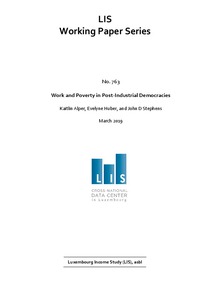Work and poverty in post-industrial democracies
"This article explores the determinants of relative market income poverty and poverty reduction in advanced industrial democracies; that is, pre-tax and transfer relative poverty and reduction in poverty rates due to the tax and transfer system. Using data from twenty countries between 1969 and...
| Main Authors: | , , |
|---|---|
| Institution: | ETUI-European Trade Union Institute |
| Format: | TEXT |
| Language: | English |
| Published: |
Luxembourg
2018
LIS |
| Subjects: | |
| Online Access: | https://www.labourline.org/KENTIKA-19307549124911257219-Work-and-poverty-in-post-indus.htm |
| Summary: | "This article explores the determinants of relative market income poverty and poverty reduction in advanced industrial democracies; that is, pre-tax and transfer relative poverty and reduction in poverty rates due to the tax and transfer system. Using data from twenty countries between 1969 and 2014, we show that the primary determinants of market income poverty are the availability of work, deindustrialization, and union involvement in minimum wage setting. Contrary to expectations, we find that wage dispersion in the lower half of the income distribution does not affect household poverty. We then show that the main determinant of poverty reduction is social spending on the non-aged. These results suggest that the main way in which states affect poverty via social policy is through the tax and transfer system, and that market income poverty is primarily the result of factors affecting volume of work and remuneration levels at the bottom of the distribution." |
|---|---|
| Physical Description: | 24 p. Digital |

